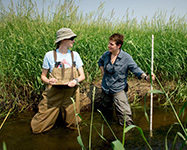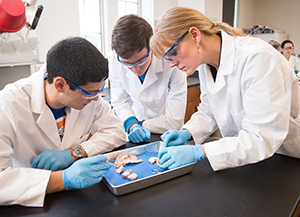Background
What is Intellectual Virtue?


Virtues are positive character traits developed through practice and habit. Intellectual virtues are those character traits concerned with the intellectual goods of truth, knowledge, and understanding. So called, virtue epistemology has been studied since the first philosophers, most notably by Aristotle. Aristotle held that virtues are necessary for the flourishing of both the individual and society because they enable the achievement of proper goals. Moreover, that such virtues were the mean between the extremes for any character trait – too much, or an excess, and too little, or a deficiency. For example, the virtue of courage is a disposition to confront challenges in an appropriate manner, for which the deficiency is the vice of cowardice, or fear or self-concern, while excess is the vice of recklessness, or lack of concern or lack of caution.
Why is Intellectual Virtue Relevant to Science?


Individual virtues can help scientists achieve their goals of good scientific thought and action: accurate, reproducible, and defensible scientific truths. Moreover, such virtues can be mapped onto the distinct components of science conduct, such as hypothesis development, implementation of studies, data analysis and interpretation, and presentation of conclusions. More broadly, these intellectual virtues are vital for the processes of thinking and learning that are needed for success in any endeavor. Individual intellectual virtues are overlapping and mutually supportive. For example, being intellectually courageous means being able to think differently, which requires a certain degree of autonomy needed to think independently when seeking answers to questions, or solutions to problems. These virtues, in turn, require the support of other virtues, such as the wonder needed to ask good questions, and the tenacity to continue asking questions even when answers do not come easily.

Why is Intellectual Virtue relevant to Training in Science?
Intellectual virtues are more than simply a body of knowledge to be taught as an academic discipline. Arguably, these virtues are habits to be understood, modeled, and practiced. Some educational institutions, K-12 as well as universities and colleges, have established programs aimed at developing intellectual virtue. For example, the Intellectual Virtues Academy of Long Beach is a middle school with a curriculum explicitly organized around intellectual virtues. At the University of Oklahoma, the Institute for Study of Human Flourishing has initiated programs to study and promote virtues among undergraduate students throughout the institution. Such programs should be more widespread in colleges and universities, with intellectual virtue integrated consistently throughout the curriculum. Specifically, there is a need for such integration of intellectual virtue into science curriculum. Such integration could involve simply highlighting the importance of intellectual virtue in the scientific process, or with courses that specifically develop and maintain intellectual virtues in scientist in training.

Information about virtues can be shared in courses and seminars, but sustaining their influence over the long-term requires much more than classroom instruction. An effective and long-lasting education in the intellectual virtues requires resources to help undergraduate and graduate students as well as instructors and mentors who assist with development of intellectual virtue. Faculty and students must also have space and time to learn, reflect, and practice intellectual virtue. This could include setting aside physical space for reflection and discussion as well as building time into the curriculum for relevant coursework. Moreover, a program that promotes intellectual virtue needs to be integrated, multifaceted, and comprehensive enough to pervade not only classrooms but also the campus environment as a whole so intellectual virtue it is reinforced and refined. Ultimately, the aim should be to create a community of practice that includes colleagues and mentors who encourage and facilitate the development of intellectual virtue across the institution, in both students and faculty alike. At its most simple and direct, developing intellectual virtue involves making what is often implicit much more explicit in how scientists are taught and trained to do science. Another component should be inclusion of exemplars of intellectual virtue, peers, instructors and notable scientist and non-scientists.

What are Specific Intellectual Virtues?
Contemporary scholars in the fields of virtue epistemology, epistemic cognition, and education psychology have identified an aspirational lists of ideal character traits. Based on that large body of work about character and virtue, especially that of Jason Baehr, the following ten master intellectual virtues seem especially relevant to the conduct of science.
· Attentiveness is the ability to remain focused on a particular task in a way that uncovers important details.
· Autonomy is the capacity for self-directed thinking independent of others.
· Carefulness is the practice of sound thinking while avoiding intellectual pitfalls and mistakes.
· Courage is a commitment to continue taking intellectual risks despite the possibility of embarrassment or failure.
· Honesty is an awareness of the need to be fair and straightforward in one’s conduct, reliably adhering to the facts and remaining transparent about the truth.
· Humility is the willingness to admit one’s own limitations and mistakes without worrying about academic status.
· Open-mindedness is being receptive to new ideas, viewpoints, and perspectives, especially those that go against conventional wisdom.
· Tenacity is the willingness to embrace long-term objectives and not give up when confronted with challenges.
· Thoroughness is a willingness to probe for deeper meaning and understanding without settling for easy and superficial answers.
· Wonder is the disposition to inquire and explore in search of understanding, usually through deep and meaningful questions.
Sources
Baehr, J. 2011. The Inquiring Mind: On Intellectual Virtues and Virtue Epistemology. Oxford University Press, Oxford, UK.
Baehr, J. (Ed.) 2015. Intellectual Virtues and Education: Essays in Applied Virtue Epistemology. Routledge, Abingdon, UK.
Battaly, H. 2015. Virtue. Polity, Cambridge, UK.
Dow, P.E. 2013. Virtuous Minds: Intellectual Character Development. IVP Academic, Westmont, IL.
Paul, R. and L. Elder. 2006. Critical Thinking Tools for Taking Charge of Your Learning and Your Life (2nd Edition). Pearson Press, Upper Saddle River, NJ.
Peterson, C. and M.E.P. Seligman. 2004. Character Strengths and Virtues: A Handbook and Classification. Oxford University Press, Oxford, UK.
Ritchhart, R. 2004. Intellectual Character: What It Is, Why It Matters, and How to Get It. Jossey-Bass, Hoboken, NJ.
Roberts, R.C. and W.J. Wood. 2007. Intellectual Virtues: An Essay in Regulative Epistemology. Oxford University Press, Oxford, UK.
Snow, N.E. (Ed.) 2014. Cultivating Virtue: Perspectives from Philosophy, Theology, and Psychology. Oxford University Press, Oxford, UK.
Zagzebski, L. 1996. Virtues of the Mind: An Inquiry into the Nature of Virtue and the Ethical Foundations of Knowledge. Cambridge University Press, Cambridge, UK.